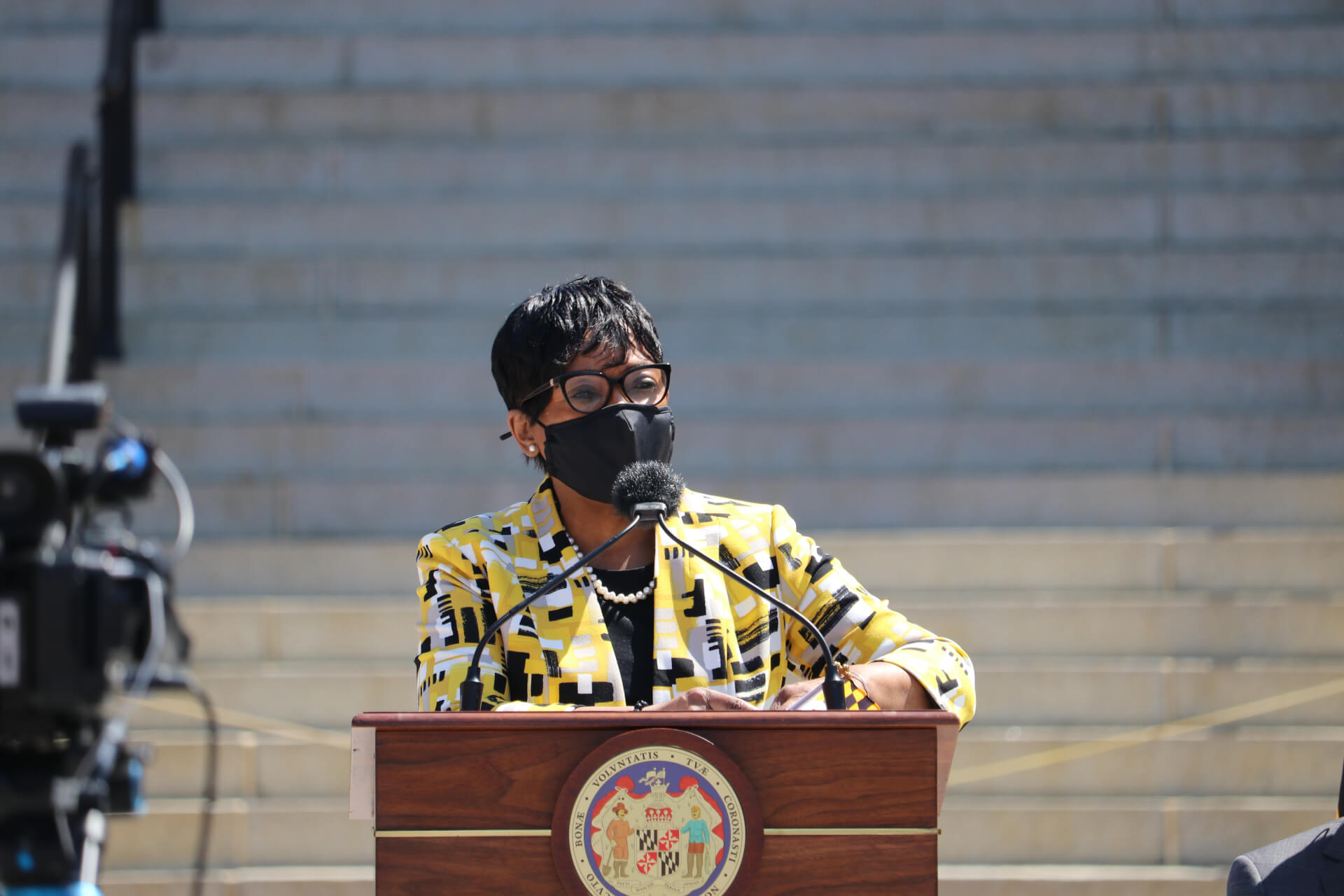Josh Kurtz: ‘You Could Call It a Miracle Session,’ Speaker Jones Says

House Speaker Adrienne A. Jones (D-Baltimore County) was in her Annapolis office the other day, enjoying the solitude.
“It’s quiet,” she told a reporter, a few days after her colleagues had left town following an unusually intense but productive General Assembly session. “I can get a lot of work done.”
Immediately after session ended, Jones released a statement calling it “one of the most consequential sessions of the last 20 years.” By the end of last week, she had had some time to reflect on what was accomplished and how, under unique and trying circumstances, it had all come together.
“It seemed like you could call it a miracle session,” she said.
For a political leader who generally keeps her opinions to herself, that was no hyperbole.
When the session began in mid-January, nobody knew if anything was going to work — the health and safety protocols, the technology, or the legislative strategy. No one knew if lawmakers, many of whom have come to love the carnival-like atmosphere associated with the 90-day session, with them as the stars, would behave. And no one knew if people would stay healthy enough to keep session going for the full 90 days.
What emerged at the end was a bountiful platter of legislative accomplishments — many designed to address pressing problems laid bare by the COVID-19 pandemic. From wide-ranging financial relief, to police reform, to education funding, to legislation addressing health and economic disparities, the General Assembly delivered.
“There’s something for everyone,” Jones said.
Jones said lawmakers were laser-focused on responding to Marylanders’ needs and priorities, in a well thought out and durable way.
“We had some great legislation we were able to pass that addressed the concerns of our constituents,” she said. “It wasn’t just put a bill out there and be done with it. We worked it through in a meaningful way. To me, that’s a winner.”
Despite skepticism from an array of lawmakers, advocates and other stakeholders — skepticism partly shared by Jones herself — the legislature figured out a way to stay in touch with and respond to their constituents, even though the public was barred from the State House and other legislative buildings.
For the first time, House and Senate sessions were live-streamed; committee hearings had previously been streamed, but this year, their voting sessions were as well, and committees were required to list the bills they were voting on at the time, another first.
“We were able to deal with whatever we were faced with and still be able to do our legislative work, and communicate with our constituents,” Jones said. “Zoom became our best friend. [Constituents] really were engaged, and that was a good thing.”
For Jones herself, it was a stunningly successful session. If she retired tomorrow, the list of bills she passed this year, or helped shape, would cement her legislative legacy.
Think of the long list: Police reform. Greater funding for HBCU’s, ending a decades-long lawsuit against the state. Repealing the state song, with its racist, incendiary lyrics. Making Juneteenth a state holiday. The Walter Lomax Act providing justice for exonerees. Opening the state’s new lucrative sports betting market to minority- and women-owned businesses. Bills to end redlining and promote health equity. And more.
These measures collectively were sometimes known as the “Black agenda,” befitting the first African-American and the first woman to serve as a presiding officer in the Maryland General Assembly. But Jones and her lieutenants often simply referred to it as an agenda reflecting the state’s greatest needs and providing help to the people who needed it most.
“I think in the House a lot of the credit goes to Adrienne,” said House Majority Leader Eric G. Luedtke (D-Montgomery). “Adrienne has prioritized these issues. But a lot of it is that it is the caucus that has provided the issues — and the people who have provided the issues.”
‘I’m the one steering this body’
No one would mistake Jones’ skill set from those of the two Mikes who dominated the legislature for the past few decades. Jones’ predecessor and mentor, the late Michael E. Busch, was the beloved coach in the house, cheering his colleagues on. And across the hall, the late Senate president Thomas V. Mike Miller Jr., was such a larger than life personality that what he said and did often eclipsed the hard work of his colleagues.
Jones can be reserved to a fault. While Senate President Bill Ferguson (D-Baltimore City) held weekly virtual press gaggles in an attempt to replicate the regular gaggles that Miller held so regularly and famously on the Senate floor, Jones did not meet the press once over the 90-day session.
But her influence on her chamber and on the legislature’s work product is shaping up to be every bit as profound and consequential as the two Mikes. On the House floor this year, Jones could cut down a colleague with with a stinging remark or a dirty look.
And while she may not have been the public and vocal coach Busch was — qualities that are evident in Ferguson, though he’s younger than most of his colleagues — she did empower several junior members during legislative battles and floor debates this year — particularly younger Black members, like Del. Vanessa E. Atterbeary (D-Howard), who is 45 years old; Del. Tony Bridges (D-Baltimore City), who is 44; Del. Jheanelle K. Wilkins (D-Montgomery), who is 32.
Jones said that after almost two years on the job, she’s feeling more at ease. But nothing about her tenure has been normal — from the departure and deaths of the Mikes, to the outbreak of the coronavirus, to the natural changes and disruptions that come when a legislative chamber is under new management.
“The first year is always baptism by fire,” she said. “This year — and it’s ironic that we’re in the middle of a pandemic — but it felt like everything fell into place, despite the pandemic, because we really had to get things done…I’m the one steering this body and I take a lot of it personally. But I feel more comfortable.”
Jones also praised House committee chairs and vice chairs and said she was pleased by how well the House’s newest members took to their committee work. She said that she and other House leaders thought long and hard about where the newbies should be assigned, and felt that their hunches paid off.
Colleagues describe Jones as committed to the House’s priorities and thinking strategically about the best way to get them through.
“From before the session got started she was focused and kept us focused on what was important,” Del. Joseline Peña-Melnyk (D-Prince George’s) said in an interview on Sine Die.
Jones this year also dealt with a Republican caucus that was more vocal than it had ever been. She observed that House Republicans occupied more floor time than Democrats this year, and she couldn’t help but notice that many Republicans were filming their GOP colleagues with iPhones as they spoke.
“I imagine some will be used for the campaign time,” Jones said.
On the day after session, Republicans elected a new leadership team for the first time in eight years — Del. Jason C. Buckel (R-Allegany) as minority leader and Del. Christopher T. Adams (R-Middle Shore) as whip. Jones said she doesn’t know Adams well and has cordial relations with Buckel. But many lawmakers in both parties expect the GOP to take a more adversarial tone going forward.
“It’s too early to tell you,” is Jones’ own observation.
Jones is also learning how to get along with Ferguson, the other relatively new presiding officer who replaced a legend. Some lawmakers say the relationship isn’t that great just now — which they chalk up to a combination of generational, stylistic and institutional differences. And others say deeper tensions surfaced between the House and Senate this year, especially in the session’s tense final weeks.
But Jones downplayed any divisions.
“We’re doing OK,” she said. “Of course, in the House we always say we’re the better house. I’m sure they say the same in the other house.”
Jones is aware that not every consequential piece of legislation went through, and that some may have fallen victim to tension between the two chambers. Asked for her biggest regret about this session, she said it was that major climate legislation fell apart in the Assembly’s last hours.
“We thought we had a good product,” Jones said. “Well, in the interim, we’ll just have to work harder. But we’ll get it done next year.”
Asked what would become of the Chamber Annex, the makeshift alternate House floor that was pieced together in the Lowe House Office Building, and where half the House convened during floor sessions, Jones said she is inclined to keep it intact for at least the next several months, until health advisers know that it won’t be needed for the 2022 session.
“I don’t have a crystal ball to see where we’ll be pandemic-wise,” she said. “But at least we know it’s a viable option.”




 Creative Commons Attribution
Creative Commons Attribution